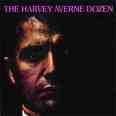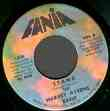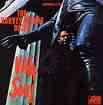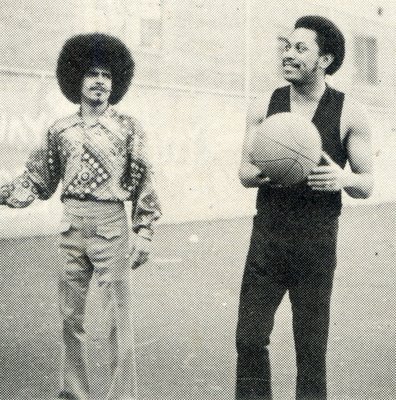Interview to Harvey Averne





I wanted to have a chat with one of the most refined arranger , composer and musician of the Latin music scene from the 50's till today in New York and the rest of the world .
Harvey Averne create the mix of Latin music together with Soul , Funk and Rock now called Latin Crossover .
His track are researched , collected , compiled and spinned by the most Groovy DJ's from the today 60's scene .
He never liked to be on front so theres no so many information about him , thats why i wanted to know more .
I discovered a great artis and a great man and friend!
You are known as the musician that combined Soul and Rock with Latin music, maintaining, in the process, subtle and refined arrangements. How did you obtain such results?
Growing up and living in New York city, which is also known as the great melting pot, I was exposed to latin music at 8 years of age,along with pop and soul, rock came later. Mixing all the elements I love together while keeping the feeling natural & logical was the chalange. Marty Sheller used to play trumpet in my salsa band ( Arvito band) which played pure salsa only, I never wrote an original song or recorded with the Arvito band. We would copy arrangements from records IE: Tito Puente, who was my biggest influence, Cuban recordings etc. Larry Harlow, Eddie Palmieri, Louie Ramierez and many great and talented musicians all played in the Arvito orch. So I guess I had a good eye for talent from the very beginning. The Arvito Band Played dances and clubs including the world famous "Paladium" with all the great latin bands of the day( 1953 thru 1965 . I played vibes & was the band leader. Arvito ( spanish sounding for little Harvey, originally " Harvito" but the" H" was dropped because "Arvito" sounded more spanish. In the late 60s when I started recording for Fania I wanted to combine the all elements to appeal to all audiences and the Harvey Averne Dozen was born. the majority of the arrangements and ideas were in the very capable hands of Marty Sheller, I gave him some ideas, but he understood whatever concept I was cooking up at the time and needed very little guidence, he made it very easy for me. He was my go to guy for all the different" Harvey Averne bands".
You music is often described as Latin Crossover. What do you think?
Yes thats what i was trying to do.
Many of the tracks on your first albums are Pop and Soul covers from that period. What were your musical tastes?
All of the above, salsa, soul, rock, but especially the Beatles, & Sly and the Family Stone,
That is why I always did instrumental versions of thier songs on all my albums but in a very different, highly stylized way, ala the "Harvey Averne Dozen" style which was very original and like no other recording of their great material.
I know that you play the vibraphone and the piano as well as having a fantastic voice. How much has the fact that you
are a musician influenced your career even though you are a producer?
I was never very comfortable performing on stage which is why in 1972 I stopped making the " Harvey Averne" recordings altogether. I was the leader of the " chakachas " in 1972 ( Jungle Fever) which sold over 2 million, we played the Apollo theatre 4 times in 1972 and I was offered to be the head of United Artists Latino lable, I sold my instruments and retired from the stage. I guess I loved Composing, Producing, Mixing ( my love ) promoting, discovering and developing new talent, much more than performing. So to answer your question ( I bet you thought I forgot ) It taught me how to communicate and get the best out of everyone who comes into the studio to work with me.I demand more from talent than they have ever experienced,or gone inside themselves to give before, while I give tremendous freedom and want them to take chances. Remember I fired myself from performing and recording, so YOU better come to workout for me or you know what will happen ( It's not so easy to explain to yourself, when you look in the mirror in the morning, why you got fired by your own self. I love my recordings, but I think the least important element in their success was my playing\performing which did not make me so happy, but in a way limited me. As a producer I work with every facet of the recording, I find this much more important and satisfying.
Marty Sheller, already having arranged for Mongo, worked on a few of your albums. How did the arrangements come about? Was it a two way collaboration or did you occupy yourself with the writing and he with the arrangement?
As I said above the arrangements were the genius of Marty Sheller. We would talk about what was the idea for a song, and Marty would go and make it a much better idea.
You have produced a few of the most sought after albums of Latin Soul - Latin Funk and Boogaloo such as "Camel Walk" by Latinares"or "Cortijo and his Time Machine", right up to
exceptional works by Eddie Palmieri such as "Un Dia Bonito" or "Puerto Rico" and many more. Tell me about your work as a producer.
My best work (for me) has been as a Producer ( which is exactly the same function as a Movie Director, which title was used long before the record business started calling us Producers). A Producer in the movies handles the financing which in the recording industry is the domain of the record company who has the Artist I was hired to Produce under a long term contract usually. My work includes the following, album concept, casting and hiring everyone on the project, directing all performances, which is pretty easy work, because I only work with the very, very, best and get them to suprise themselves and me, because they give me more than their talent, they give me their heart and soul, which you cannot buy for money ever. And after I and everyone is totally happy with their performance. I go into the studio, always alone, to mix, fix, polish,and make love to this beautiful work of art and after hundreds of hours of creating this little masterpiece, I apoligize to the goddess of music for fogiveness, because I have done the best I am capable of doing, and then and only then is the product offered to the public.
I'm very curious about the term "NewYorican Sound". What
does it mean? Do you feel a part of it? " Nuyourican" is a term used to discribe a Puertorican born in New York, not on Puerto Rican soil. To me the New York Salsa is totally different from the mas tipica salsa from the islands of Puerto Rico or Cuba. I have worked with some of the best from Cuba IE: Jose Fajardo, Celia Cruz, Orquesta Broadway, La Lupe, etc. From Puerto Rico IE: Cortijo, Ismael Rivera, Lalo Rodriguez, Danny Rivera and many more. And from New York : Eddie Palmieri, Ray Barretto, Larry Harlow, Hector Lavoe, Willy Colon, Ismael Miranda, Machito, Tito Puente, and many, many more. The sound from Cuba and the sound from Puerto Rico is very different from the New York salsa sound, which is a harder, stronger, swing, if you listen closely, you can hear the taxis & the car horns blasting, and the busy pace, and the tall buidings & the cement streets etc. as in Eddie Palmieri's music. Or life in glorious Havana, back in the day, when you hear Celia Cruz con La Sonora Matancera, or Jose Fajardo, or Orquesta Aaragon, or from Puerto Rico: El Gran Combo, Cortijo con Ismael Rivera, Lalo Rodriguez, Danny Rivera, Frankie Ruiz and many, many,many more. You can hear the palm trees swaying, and you feel the island breeze, and as soon as you get off the plane,you notice that the music is in the air. You ask me if I feel a part of it??? My friend Alessio, all Latin music has and is my life, my heart, my soul, mi sangre, without it my life would not have had any meaning at all.
You have recorded for labels, well-known and not so well-known, such as Atlantic, Fania or Heavy Duty. Each album is quite different but always maintaining the typical Harvery Averne Sound.
Which label has given you most space for experimentation?
I have been very lucky and from the first Atlantic recording which was originally recorded for Fania, I have always had complete creative control and freedom, and for that I thank Jerry Masucci from fania, Jerry Wexler and Arif Mardin from Atlantic, Mike stewart and Mike Lipton from United Artists, Morris Levy from Roullete and Tico, etc. But my best work was for my own company "COCO RECORDS " because it was my money on the line I could follow the production with a specialized promotion to the media, radio, clubs, public etc . the participation from the signing of the Artist to the release of the album and everything in between was amazing & the results were awesome.
Personally, I discovered you after the release of "Heavy Duty" on Acid Jazz records in 1994, after which I began to look out
for you. What do you think of the rediscovery of bands and sounds by new labels and the consequent rebirth of the sound of the 60's and 70's?
Acid Jazz has never given me a royalty or any money since the mid 90s, I like the exposure, but one of these days I will sue their ass off!!! I still own heavy Duty Records and the "harvey Averne Barrio Band" album and the "Toro" album and they are still available for license in some countries, including Italy, England, France, Japan, and others.
Your vinyl records are sold at auction and are quite rare. What was the distribution in the 70's like? Was there much call for that type of music?
Not as good as now. France, French speaking Africa, Spain, were the most important in Europe. on a lesser level Italy, England, Holland etc. Of course South America, Carribean, and USA were the strongest.
What are you doing now? Productions? arrangements? What are your plans for the future?
I am the President\Ceo of a new Reggaeton company, with two partners, Alex Masucci and a wonderful young talented producer of hip hop & reggaeton Willy LA Fama. We are finishing a tribute reggaeton record inspired by my dear friend Ray Barretto's monster hit of the 60s "El Watusi".
Just recently Ray Barretto passed away. You knew him, whatmemory do you have of him?
I Produced his 1st. album for Fania Records "Acid" a monster classic. he was a great artist, congero, composer, person,. He did more for JAZZ groups using conga than anyone who ever lived and his SALSA recordings are his legacy. He will be missed and never replaced or forgotten, one of the most important artists in salsa history.
Labels: alessio berto, boogaloo, fania all stars, groove, harvey averne, heavy duty, jazzmotel, joe bataan, larry harlow, latin, nueva york, vampisoul


